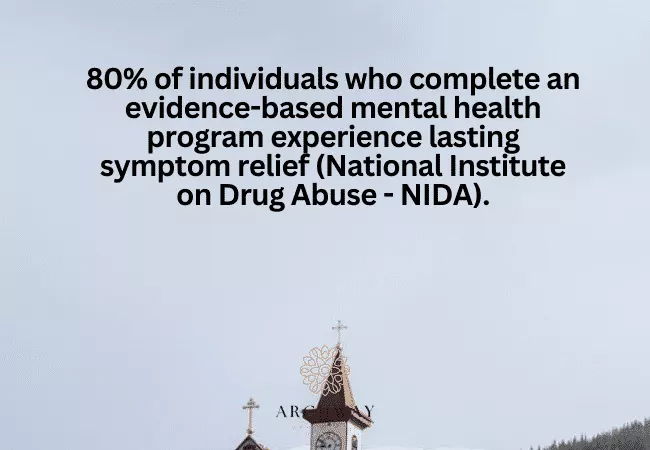Mental health disorders affect millions of individuals across the U.S., yet many struggle to find effective, research-backed treatments. According to the National Institute of Mental Health (NIMH), over 57 million U.S. adults experience a mental illness each year, yet only half receive professional treatment.
Finding the right Mental Health Treatment Center that offers evidence-based therapies can be the key to achieving long-term emotional stability and well-being. At Archway Behavioral Health, we provide comprehensive, research-backed mental health treatment services for individuals struggling with anxiety, depression, bipolar disorder, trauma, and other conditions.
This guide explores:
- What evidence-based mental health therapy is
- The most effective therapy approaches for mental health treatment
- Different levels of care, including PHP and IOP
- How to choose the right Mental Health Treatment Center in Florida
What Is Evidence-Based Mental Health Therapy?
Evidence-based mental health therapy refers to treatment approaches that are scientifically researched, tested, and proven effective. These therapies are backed by clinical studies and decades of psychological research, ensuring they provide measurable improvements in mental health symptoms.
Unlike alternative or experimental treatments, evidence-based therapies are:
✔ Clinically tested and research-supported
✔ Used by licensed mental health professionals
✔ Adaptable to individual treatment plans
✔ Designed to reduce symptoms and prevent relapse
At Archway Behavioral Health, our Mental Health Treatment Center in Florida uses evidence-based methods to treat a range of mental health disorders, including anxiety, depression, bipolar disorder, PTSD, and trauma-related conditions.
Evidence-Based Therapies Used in Mental Health Treatment
1. Cognitive Behavioral Therapy (CBT): Reshaping Thought Patterns
Cognitive Behavioral Therapy (CBT) is one of the most widely used evidence-based therapies for anxiety, depression, and PTSD.
How CBT Works:
- Helps individuals identify and change negative thought patterns that contribute to mental health symptoms.
- Focuses on problem-solving techniques to cope with stress and triggers.
- Encourages behavioral activation, promoting positive actions to improve mood.
Research shows that CBT is 60-80% effective in treating anxiety, depression, and PTSD (Journal of Clinical Psychology).
2. Dialectical Behavioral Therapy (DBT): Emotional Regulation and Distress Tolerance
Dialectical Behavioral Therapy (DBT) was originally designed for borderline personality disorder but is now widely used for anxiety, depression, bipolar disorder, and trauma recovery.
Key DBT Techniques:
- Mindfulness: Learning to stay present and reduce rumination.
- Distress Tolerance: Managing emotional crises without harmful behaviors.
- Emotional Regulation: Controlling intense emotions effectively.
- Interpersonal Effectiveness: Improving communication and relationship skills.
DBT is particularly beneficial for individuals with trauma, self-harm tendencies, or emotional dysregulation.
3. Individual Therapy for Personalized Support
One-on-one therapy sessions provide private, tailored support for individuals dealing with mental health challenges.
Benefits of Individual Therapy:
- Offers a confidential space to discuss personal struggles.
- Helps identify root causes of mental health symptoms.
- Develops coping strategies tailored to individual needs.
4. Group Therapy: Community Support and Shared Healing
Group Therapy Programs offer individuals the opportunity to connect with others facing similar struggles in a structured, therapist-led setting.
Why Group Therapy Is Effective:
- Reduces isolation and loneliness.
- Encourages peer support and shared coping strategies.
- Teaches social skills and emotional resilience.
Studies show that Group Therapy reduces symptoms of anxiety and depression by 30-50% (American Group Psychotherapy Association – AGPA).
5. Trauma-Focused Therapy for PTSD and Emotional Healing
For individuals with trauma-related disorders, specialized Trauma Treatment Programs use targeted therapies to help process past experiences.
Types of Trauma Therapy:
- Eye Movement Desensitization and Reprocessing (EMDR): Reduces PTSD symptoms by helping the brain reprocess traumatic events.
- Trauma-Focused CBT (TF-CBT): A specialized form of CBT tailored for individuals with PTSD and past trauma experiences.
Trauma therapy is essential for individuals dealing with childhood trauma, abuse, or post-traumatic stress.
Levels of Care in Evidence-Based Mental Health Treatment
1. Partial Hospitalization Program (PHP): Intensive Day Treatment
A Partial Hospitalization Program (PHP) provides structured, full-day therapy for individuals needing intensive care without 24/7 hospitalization.
What PHP Includes:
- Multiple therapy sessions daily, including CBT, DBT, and group therapy.
- Psychiatric care and medication management.
- A structured, supportive environment for stabilization.
PHP is ideal for individuals transitioning from inpatient care or those needing a higher level of mental health treatment.
2. Intensive Outpatient Program (IOP): Flexible Mental Health Support
An Intensive Outpatient Program (IOP) provides therapy sessions multiple times a week while allowing individuals to continue work, school, or family responsibilities.
What IOP Includes:
- Flexible therapy schedules (morning/evening options).
- Ongoing mental health support while integrating daily life responsibilities.
- Structured therapy focused on relapse prevention and coping strategies.
IOP is an excellent option for individuals who do not require inpatient care but need structured mental health support.
Choosing the Best Mental Health Treatment Center in Florida
Not all Mental Health Treatment Centers provide the same quality of care. When choosing an evidence-based mental health facility, consider:
Does the center offer scientifically backed treatments?
Look for CBT, DBT, trauma therapy, and holistic treatments backed by clinical research.
Are treatment plans customized?
The best centers provide individualized treatment plans based on each patient’s needs.
Are licensed mental health professionals available?
Ensure the center has board-certified psychiatrists, licensed therapists, and experienced mental health professionals.
Is aftercare and long-term support available?
Successful recovery includes continued outpatient therapy, support groups, and relapse prevention planning.
At Archway Behavioral Health, we specialize in evidence-based mental health treatment to help individuals achieve lasting recovery and emotional stability.
Conclusion
If you or a loved one is struggling with anxiety, depression, trauma, or other mental health conditions, finding the right Mental Health Treatment Center is the first step toward healing. At Archway Behavioral Health, we provide personalized, evidence-based care through CBT, DBT, Individual Therapy, Group Therapy Programs, and specialized treatment options.
Take the First Step Toward Healing:
- Call Archway Behavioral Health at 888.488.4103 to schedule an assessment.
- Explore our PHP and IOP programs for structured mental health support.
- Start your journey toward emotional wellness today!
Mental health recovery is possible. Let Archway Behavioral Health help you reclaim your life.
Frequently Asked Questions (FAQ)
What is evidence-based mental health therapy?
Evidence-based mental health therapy refers to scientifically researched, clinically tested treatment methods that are proven effective in treating mental health disorders. These therapies include Cognitive Behavioral Therapy (CBT), Dialectical Behavioral Therapy (DBT), Individual Therapy, and Group Therapy Programs.
How do I know if I need professional mental health treatment?
You may benefit from professional treatment if you:
- Experience persistent anxiety, depression, or mood swings.
- Struggle with daily functioning, relationships, or work due to mental health symptoms.
- Have a history of trauma or PTSD affecting your well-being.
- Have tried managing symptoms on your own but continue to feel overwhelmed.
What mental health conditions are treated at Archway Behavioral Health?
Our Mental Health Treatment Center in Florida provides evidence-based therapy for:
- Anxiety disorders (GAD, panic disorder, social anxiety, OCD)
- Depression and mood disorders
- Bipolar disorder
- Post-Traumatic Stress Disorder (PTSD) and trauma-related conditions
- Co-occurring disorders (mental health and substance use disorders)
What therapies are used in your Anxiety and Depression Treatment Programs?
We use research-backed therapies to help individuals manage anxiety and depression, including:
- Cognitive Behavioral Therapy (CBT) to address negative thought patterns.
- Dialectical Behavioral Therapy (DBT) for emotional regulation and distress tolerance.
- Individual Therapy for one-on-one personalized care.
- Group Therapy Programs for peer support and shared coping strategies.
What levels of care are available at Archway Behavioral Health?
We offer multiple levels of care based on individual needs:
- Partial Hospitalization Program (PHP): Structured daytime therapy with psychiatric care.
- Intensive Outpatient Program (IOP): Flexible therapy sessions several times per week.
- Outpatient Therapy: Weekly therapy for ongoing mental health support.
How long does evidence-based mental health therapy take?
The duration of treatment depends on individual progress and treatment goals.
- PHP programs typically last 4-6 weeks with intensive daily sessions.
- IOP programs may last 8-12 weeks with several sessions per week.
- Outpatient therapy can continue for several months or longer for ongoing support.
Can mental health therapy be effective without medication?
Yes! Many individuals experience significant symptom relief through therapy alone. However, for some, medication combined with therapy provides better outcomes. Our psychiatric team evaluates each client to determine the best treatment plan.



